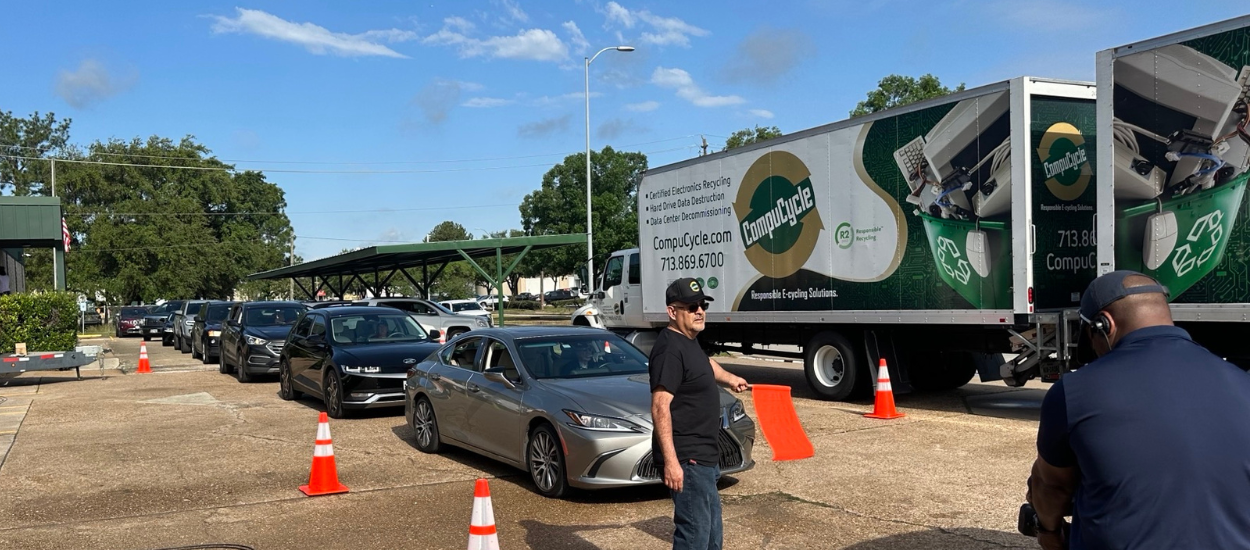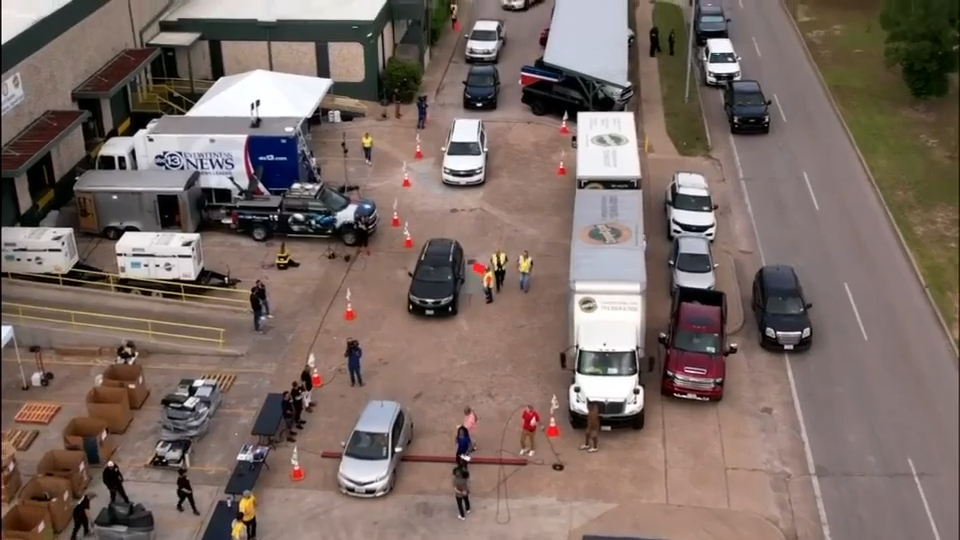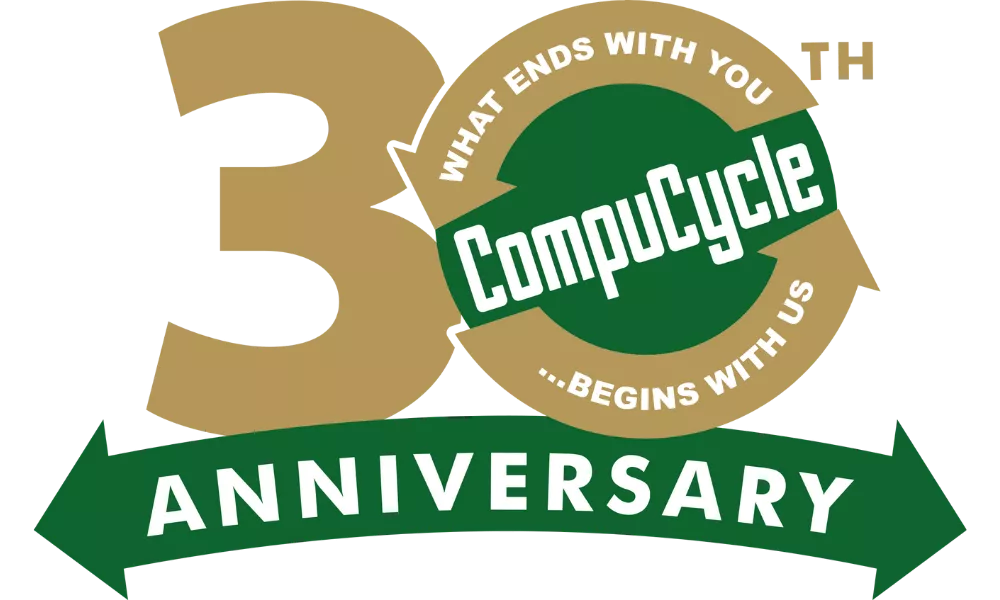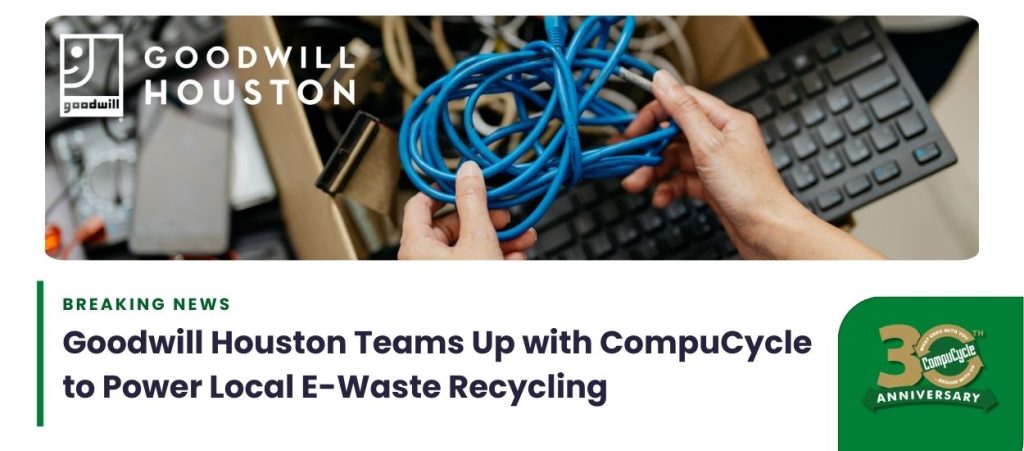
Imagine a laptop that refuses to die. Not through some miraculous technical resurrection, but by being transformed from an outdated piece of electronic waste into the building blocks of tomorrow’s technology. This isn’t science fiction—at CompuCycle, it’s the start of a process that turns yesterday’s tech into tomorrow’s resources.
The Drop-Off: A Secure E-waste Recycling Journey Begins

The morning sun rises on April 25, 2025. Cars line up, trunks pop open, each vehicle carrying a piece of technological history ready for its next chapter. Among them is a laptop, its edges worn from years of service, its screen dimmed by time. It’s not destined for a landfill, though.
As cars wind through the ABC 13 E-Cycle Drive at CompuCycle, participants discover that electronic recycling is a simple process. Free and open to businesses and individuals alike, the event offers a streamlined, secure experience for those looking to responsibly recycle their electronics.
CompuCycle’s ITAD Experts greet each vehicle, guiding participants through a quick, efficient drop-off process. Yesterday’s technology is carefully collected, ensuring it’s directed to the right processing station.
What looks like an end is actually a carefully choreographed beginning.
Behind the Scenes: Data Destruction and Electronic Waste Sorting
Inside the CompuCycle facility, skilled technicians sort devices by type, age, and condition so specialists can assess each device’s potential for reuse or recycling. The laptop joins hundreds of others that go through CompuCycle’s certified data sanitization process to ensure all sensitive information is permanently removed.
This process follows industry best practices and includes methods such as data wiping, degaussing, or physical destruction, depending on the type of device and the client’s data security requirements. Each method guarantees that the data is rendered unrecoverable in compliance with data privacy regulations.
After data wiping, the laptops undergoes a comprehensive diagnostic:
- Data security check
- Component functionality assessment
- Material composition analysis
Some devices might be refurbished for continued use. Others, like our laptop, will be carefully dismantled to recover valuable materials.
The Refurbishment Gauntlet: CompuCycle’s High-Standards for Refurbished Electronics
In the bright, meticulously organized spaces of CompuCycle’s Houston facility, the laptop faces its first critical test. Technicians with precision tools and decades of collective experience begin a comprehensive assessment that will determine its fate.
The device must clear multiple checkpoint criteria that define its potential for renewed life:
- Age: At five years old, it’s already approaching the outer limits of refurbishment viability.
- Performance: Technicians benchmark the processor against current computing standards.
- Battery Health: A crucial metric requiring at least 80% of original charge capacity.
- Physical Condition: CompuCycle holds the highest standards for refurbished devices. The criteria we use to mark a device at “C-grade” is often marked as A-grade by others.
Each component is scrutinized with surgical precision. The motherboard undergoes electrical diagnostics, probing for any latent failures. Processors are rigorously tested, comparing performance metrics against current technological baselines. Memory modules are stress-tested under simulated high-demand conditions, revealing even the most subtle performance degradations.
Most devices don’t survive this rigorous evaluation. For every laptop that might be refurbished and given a second life, several others will be carefully disassembled for material recovery. It’s not a process of elimination, but of responsible resource management.
What Happens to Rejected Devices in IT Asset Disposition (ITAD)?
If a laptop fails to meet resale standards, it doesn’t go to waste. Instead, it is systematically dismantled in-house to recover its valuable components. Reusable parts, such as RAM modules and SSDs, may be harvested and integrated into other refurbished devices, while non-functional parts are processed for material recovery.
At every step, CompuCycle ensures that no component goes to landfill unnecessarily—maintaining a closed-loop approach to IT asset disposition.
Keep Recycling Local: A Secure Journey from Device to Resource Recovery
Unlike most electronic recyclers who ship devices across state lines or even overseas, CompuCycle’s entire processing ecosystem exists within a few hundred feet of its initial sorting area. A short journey from the diagnostic center to the material recovery plant represents more than mere proximity—it’s a commitment to secure, transparent, and responsible electronics recycling.
The laptop moves through a carefully controlled internal pathway, never leaving the 130,000 square foot Houston facility. This approach eliminates the risks associated with external processing: no uncertain chain of custody, no potential for data breaches, and a dramatically reduced carbon footprint.
- Preventing Environmental Contamination: Responsible E-Waste Recycling
Left in a landfill, this laptop would become an environmental hazard. Electronic waste leaches toxic substances that poison soil and groundwater:
- Lead from solder and cathode ray tubes
- Mercury in switches and flat-screen displays
- Cadmium from battery components
- Brominated flame retardants in plastic casings
At CompuCycle, each component is systematically extracted and processed to prevent these environmental threats.
- Metal Extraction: Transforming Obsolete Technology into Valuable Resources
The laptop moves into CompuCycle’s material recovery plant, where the process ramps up. Shredders break it down into smaller pieces—metal, plastic, and circuit boards sorted out with mechanical precision. The aluminum frame is cleaned and prepped, copper wiring is separated and bundled, and circuit boards, containing trace amounts of gold, silver, and platinum, are processed in-house. CompuCycle’s 130,000-square-foot Houston facility handles the full breakdown—dismantling, shredding, sorting, and cleaning—all under one roof. Rare earth elements, tucked into components like magnets and processors, are extracted here with specialized techniques, recovering critical materials essential for modern tech.
- E-Plastics: A Revolutionary Domestic Recycling Solution
Watch CompuCycle’s e-plastics plant in action to see this revolutionary process firsthand
CompuCycle is the only electronic recycler in the United States with an in-house facility capable of cleaning and processing e-plastics to a level that allows for immediate resale and reuse by Original Equipment Manufacturers (OEMs).
Most recyclers either export e-plastics or downcycle them into lower-quality materials that have limited use. In contrast, CompuCycle’s advanced e-plastics processing system sorts, cleans, and prepares plastics to meet OEM specifications—eliminating the need for virgin plastic in new electronics manufacturing.
How CompuCycle’s E-Plastics Plant Stands Apart:
- Advanced separation into their various types: Polyethylene, Polypropylene, Polystyrene & ABS
- A sophisticated float/sink system separates and washes the plastics
- The cleaned plastics are then run under a powerful magnet that pulls out any metallic, or ferrous, materials
- The cleaned and sorted materials are dried into flakes, put into boxes are are ready for immediate resale to Original Equipment Manufacturers (OEMs) for domestic reuse
This closed-loop recycling model not only prevents electronic waste from ending up in landfills but also reduces dependence on fossil-fuel-based plastic production—making CompuCycle a true leader in sustainable electronics recycling.
A Closed-Loop Future: Every Laptop Recycled Makes a Difference
Recycling a single laptop prevents toxic e-waste from entering landfills, reduces demand for raw materials, and conserves the energy required to manufacture new components. Recycling electronics, such as laptops, significantly conserves energy and recovers valuable materials. According to the U.S. Environmental Protection Agency (EPA), recycling one million laptops saves the energy equivalent to the electricity used by over 3,500 U.S. homes in a year (EPA, n.d.). This underscores the substantial energy savings that responsible e-waste recycling provides.
Additionally, recycling electronic devices allows for the recovery of valuable materials, including copper, aluminum, and trace amounts of gold, reducing the need for raw material extraction and minimizing electronic waste (EPA, n.d.).
By keeping materials in circulation through responsible recycling and domestic processing, CompuCycle helps close the loop—ensuring valuable resources are recovered and reused rather than wasted.
The impact goes beyond one device. When businesses and individuals choose to recycle responsibly, they contribute to a sustainable future where yesterday’s technology becomes the foundation for tomorrow’s innovations. Join us at ABC 13 & CompuCycle’s E-Cycle Drive and be part of the movement toward a waste-free future. Together, we can ensure yesterday’s technology powers tomorrow’s innovations.
This Earth Day, and every day, the power to protect our planet starts, and ends with us. ????♻️
Recent Articles
Goodwill Houston Partners with CompuCycle to Offer Simple, Responsible Electronics Recycling for the Community
Goodwill Houston and CompuCycle have partnered to give Houstonians a simple, trustworthy way to donate and recycle household electronics.
Through this collaboration, residents can drop off laptops, desktops, tablets, monitors, and other household electronics at participating Goodwill Greater Houston donation centers. Reusable items help fund Goodwill’s job training and community programs, while non-resellable electronics are sent directly to CompuCycle’s certified Houston facility for secure, fully in-house recycling—ensuring materials are responsibly processed locally from start to finish.
CompuCycle Becomes Exclusive Woman-Owned E-Waste Processor in Texas with ISO 27001 Data Security Certification
New Information Security Management System (ISMS) Certification Guarantees End-to-End Data Confidentiality and Integrity for Corporate IT Asset Disposition (ITAD). HOUSTON, TX – December 9, 2025 – CompuCycle, an industry leader in secure and sustainable IT…
Secure Electronics Disposal in Houston: Why the City’s Largest Industries Trust CompuCycle
When a major healthcare system decommissions thousands of laptops, or an oil and gas company retires an entire data center, one question comes up again and again: What happens to all that data — and…
CompuCycle Executives Join R2 TAC and e-Stewards Leadership Council to Advance ITAD Standards
Houston-based ITAD provider deepens its industry influence through active participation in standard-setting committees. As corporate ITAD needs evolve alongside stricter compliance and ESG requirements, CompuCycle continues to lead the way—this time by contributing directly to…



